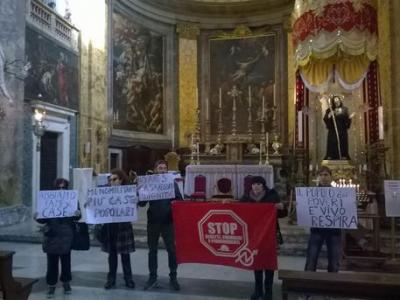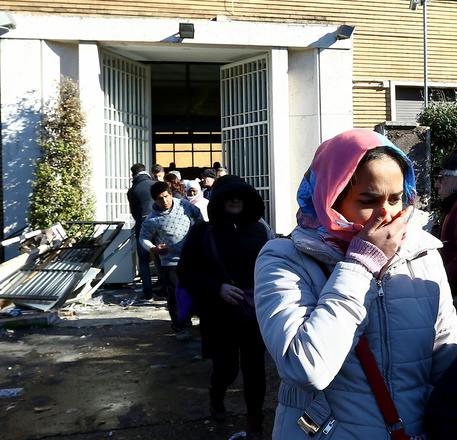Rome church occupied by housing activists

ROME -- Housing activists have occupied a church in central Rome in protest against continued evictions by the authorities, and are demanding "a Jubilee suspension of evictions and forced evacuations."
"There are 50 of us inside the church and around 200 outside," explained those within the housing movement activist group on Friday. "The priest, who is celebrating mass, has promised to mention the evictions issue." Protesters are carrying signs inside the church inscribed with messages such as "We are hungry for houses", "The poor population is alive and breathing" and "Fewer police, more live-able houses."
The occupation follows clashes between police officers, activists and occupants on Thursday after order forces tried to evict an abandoned building in Viale Ostiense in the Montagnola university zone. The building had been occupied a few hours earlier by activists from 'Action', a group fighting for the protection of the right to adequate housing.
When police officers tried to enter the property some of the more militant activists began throwing bottles and other objects at the officers, who responded by opening up fire hoses to try and disperse them. Around 100 activists and occupants were present, and police authorities report having made some arrests.
Protesters wrote in statement, "In the last 13 years, the movements which fight for the right to shelter have been the only ones able to produce responses and obtain approval in a context of a serious housing emergency that is affecting over 50,000 families."
"Thanks to the determination of hundreds of people who have organised themselves to resist evictions by occupying and protesting, after years of the complete absence of policy in this regard the region has sanctioned the first 200 million euros for the establishment of an emergency housing plan, money that has however been frozen for over 2 years. Two years in which Rome's city council has done nothing."
In a post on the 'Action' group's Facebook page on Friday, activists wrote that "in a situation of complete stalemate and endless putting off of concrete solutions to contain, at the very least, a visible emergency, we have decided upon the practice of occupation as an extreme act of denunciation, as well as to address the immediate urgency. Another option is that of the requisition and eventual use of empty and abandoned buildings, to be regenerated."
ft



